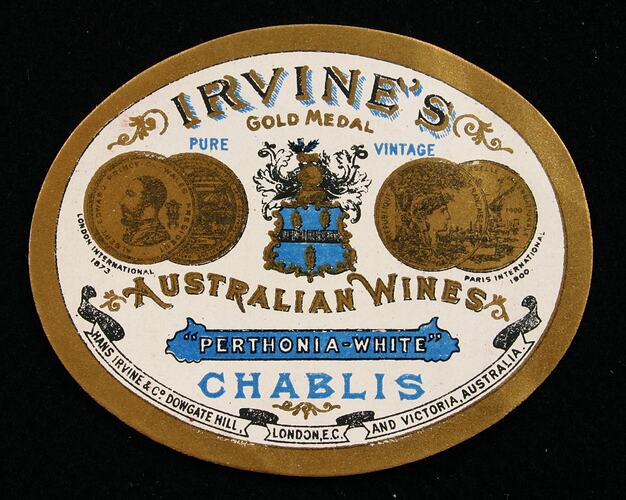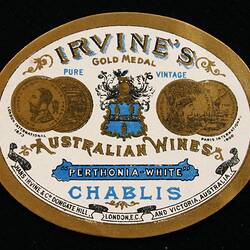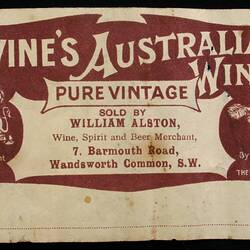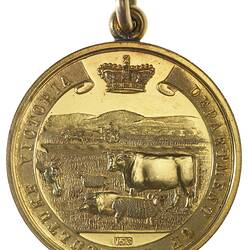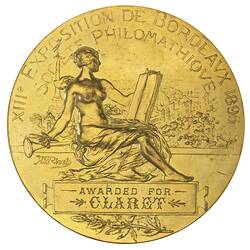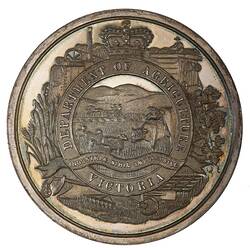Hans William Henry Irvine, vigneron and politician, was born in Melbourne on 2 August 1856. He was apprenticed to a printing firm to learn lithography, but showed such promise in sales and management that he quickly became foreman. Before long he had acquired a share of the business, aided by his father. In 1885, at the age of 29, he married Mary Jane Robinson. They had no children.
Irvine soon became wealthy, investing in land, mining and viticulture. He sold his shares in the printing trade and in 1888 acquired the Great Western vineyard, cellars and winery, as well as grazing land. In the next two years he acquried more vineyards, and obtained the services of Frenchman Charles Pierlot, a former employee of the champagne house Pommery & Greno. Irvine saw the potential of sparkling wine and in 1890 laid down 2,000 bottles. The following year he made the first of many journeys to Europe to investigate the possibility of an export market to Britain and wine-making practices in France. He was an effective self-promoter, and in 1892 he entertained the Victorian governor in lavish style. He also pioneered wine advertising.
In the early 1890s Irvine purchased two-thirds of the produce of local vignerons, much of which was distilled into his brandy. He also became known for his claret, hock, chablis, burgundy, hermitage, sparkling hock and sparking burgandy. He was particularly interested in the science of wine-making, and used the latest technologies in his cellars. These contributed to his success at a time when so many other Victorian wine-makers were struggling. In 1892 he was commissioned by the Victorian minister of agriculture to write a report on the Australian wine trade. Two years later he suggested a conference of vignerons to discuss problems facing the industry, and supported the proposal for a college of viticulture and the introduction of phylloxera-resistant American root stocks. He encouraged industry self-regulation through an elected board, the establishment of regional wineries and cheaper finance for investors in the wine industry.
In 1895 Irvine was overseas again, and received a Bordeaux Exhibition Prize in France for his claret (NU 18541). In 1896 he won a medal for his red wine in the Warrnambool Industrial & Art Exhibition (NU 17890). In 1902 he won the Champion Prize of Australia medal from the Royal Agricultural Society of Victoria for his dry wine (NU 18543).
Irvine's mining interests focused on the Black Rock range in Western Australia. He had earlier used cyanide to yield rich profits from disused ore dumps. In 1901 Irvine was elected to the Legislative Council for Nelson Province, and was considered to be a liberal. In 1905 Irvine became the first president of the Viticultural Society of Victoria. By 1906 Irvine had 250 acres (101 ha) under vine at Great Western, as well as cellars in Melbourne and a depot in London. He soon had over a mile of 'drives' excavated at Great Western for the underground maturation of wine. He became known as the 'wine king of Australia'. In 1906 Irvine resigned his seat to contest the Grampians in the House of Representatives. He held the seat until 1914 and was a staunch supporter of Alfred Deakin. His wife died the following year.
In 1918 Irvine sold his wine interests to Benno Seppelt, bought a grazing property at Kerrisdale and retired to South Yarra. In 1922 he went to England to seek treatment for a gastric ulcer. He was operated on in London, but died after the operation, on 11 July. His body was returned to Victoria for burial.
References:
Australian Dictionary of Biography Online Edition, http://www.adb.online.anu.edu.au/biogs/A090433b.htm , accessed 18/6/2008.
More Information
-
Keywords
-
Authors
-
Article types
